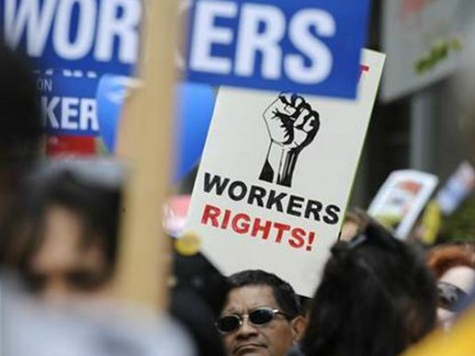
Just when everyone thought convicted former Governor Rod Blagojevich (D-IL) was off the public scene, his actions took center stage on Jan. 21 at the Supreme Court in Harris v. Quinn. This could be an important First Amendment case that could significantly weaken labor unions.
In its 1977 Abood v. Detroit Board of Education case, the Supreme Court had held that it doesn’t violate the Constitution to require government employees to be part of a union. The Court held 6-3 that this was okay because it maintained “labor peace” – a decades-old reference to union riots that could destroy whole factories – and because of “free riders” who could refuse to join the union yet still benefit when the union secured wage increases for all the workers in that agency.
Some healthcare workers stay at home with needy people – sometimes family members – to keep them from being placed in a facility. Medicaid can make payments to these workers to partially offset the cost. Gov. Blagojevich designated the state affiliate of the SEIU – one of the most aggressive of the liberal labor unions and fierce supporters of him – as the sole union to represent these homecare workers in seeking increased Medicaid payments. These workers are all forced to join the union and pay dues to the union as a matter of law. The constitutional question is whether this violates these workers’ free speech rights, since many of them object to what SEIU stands for generally, and even might not agree with what the union is asking for in Medicaid payments.
This seemed legal under Abood as the lower courts in this case already concluded. Liberal and conservative judges agreed that the Supreme Court had ruled this setup constitutional.
Then in 2010 the Supreme Court decided Knox v. SEIU, holding that increasing mandatory union dues to fund political speech that union members might not agree with is unconstitutional. The Court ruled, “The First Amendment protects the decision of both what to say and what not to say.” In Harris the Court started exploring whether Knox required reconsidering whether Abood is still the law.
Justices Samuel Alito and Anthony Kennedy seemed very skeptical of the pro-union arguments. Notably, Chief Justice John Roberts, who normally takes a narrow approach to avoid overruling prior precedent, also confronted the issue head-on in broad terms, as he sometimes does in First Amendment cases. Although Justice Clarence Thomas was customarily quiet, he has indicated in his written opinions in prior cases that he is dubious of government’s compelling anyone to engage in speech with which they disagree.
Interestingly, one vote that could be up for grabs is that of Justice Antonin Scalia. Although he takes a broad view of free-speech rights, he also tends to be skeptical of trying to rule in a way that removes politics from the political arena. Here there are government workers under elected political leaders, and Scalia says it may be unavoidable that those politicians will try to reward supporters because courts may not be able to draw lines that separate speech from politics. Scalia asked hard questions of both sides in this case.
Regarding the allegation that the former Illinois governor gave the union here some political payback, U.S. Solicitor General Donald Verrilli said that courts should not speculate about politicians’ motives. Alito balked, saying, “I thought the situation was that Governor Blagojevich got a huge campaign contribution from the union, and virtually as soon as he got into office, he took out his pen and signed an executive order that had the effect of putting, what was it, $3.6 million into the union coffers?”
It is not certain which way Harris will go. However, it is certain that Blagojevich’s naked partisanship and crass politicking with taxpayer money to support his boosters highlighted a very troubling situation for the justices and may push the Court to continue what it started in Knox, revisiting some cases that unions have counted upon for decades.
A decision is expected in June.
Ken Klukowski is senior legal analyst for Breitbart News and a fellow with the American Civil Rights Union. Follow him on Twitter @kenklukowski.

COMMENTS
Please let us know if you're having issues with commenting.